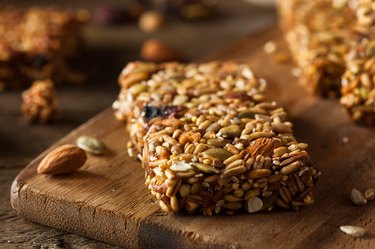
Fiber is an important part of the diet. Some foods, such as Fiber One bars, contain extra fiber as a way of helping you get all of the fiber you need to maintain the health of your digestive tract. However, some people may develop gas as a consequence of the fiber in these bars.
Fiber One Bar Fiber Content
Video of the Day
Fiber One bars provide 9 g of fiber in each serving, although the label does not provide information for the amounts of soluble and insoluble fiber. Some of the fiber in the bar comes from whole oats. Additional fiber comes in the form of chicory root, which can be harvested for its inulin, which is a kind of soluble fiber.
Video of the Day
How Fiber Affects Your Digestive Tract
Fiber can cause gas because of how it passes through your body. Although fiber is a carbohydrate, your digestive tract does not contain the enzymes necessary to break it down, which means it cannot be absorbed by your intestines. This fiber helps add bulk to your stool. However, the bacteria in your intestines can break down fiber, producing gas as a result of this carbohydrate metabolism.
Special Role of Inulin
One of the reasons why Fiber One bars may give you gas is their main ingredient -- chicory root -- which is rich in inulin. Inulin is often used as a fiber supplement because it is slightly sweet and adds texture and flavor to foods. According to the "British Journal of Nutrition," inulin is also more easily used as food for intestinal bacteria than other kinds of fiber, making it easy for them to produce gas.
Solutions
Although the gas produced due to eating Fiber One bars is not medically dangerous, it can cause significant discomfort and embarrassment. One way to minimize this gas production is to gradually increase your fiber intake, as this gives your digestive tract time to adjust to the extra fiber. If one bar gives you gas, starting with half a bar at a time may reduce your symptoms, and you can gradually eat more and more of the product. You may also want to switch to a different kind of bar without inulin or chicory root, due to inulin's ability to be easily broken down by intestinal bacteria.